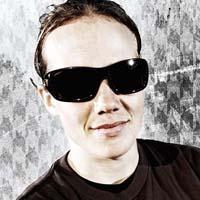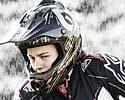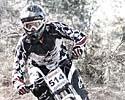
Recently on Cyclingnews.com |
MTB index page for all MTB content
An interview with Tracy Moseley, May 16, 2009
Defying gravity
British downhiller Tracy Moseley is back at the top of her game after an off-season move to the new Trek World Racing team. Moseley leads the women's UCI World Cup rankings after a win at the opener in Pietermaritzburg, South Africa, and a second place at round two in La Bresse, France. Cyclingnews' Sue George talked to Moseley to find out how she's adapting to her new team and what it's like to be one of the world's best female downhillers.
 |
The life of a pro downhiller can be challenging - something Tracy Moseley knows firsthand. During her nine years of racing for the Kona Team, Moseley's racing operation was largely a one-woman show. She handled her own travel logistics, arranged for her own race mechanics and ordered and tracked all of her spare parts. This year, since she switched over to the new Trek World Cup racing team, all she has to do is race. The focus has been paying off.
"It's been a big change in that last year I organized everything. I had a lot to do that took significant time and energy. Now [Team Manager] Martin [Whiteley] takes care of the entire travel schedule and ordering our parts. There is less for me to worry about.
"It's fantastic because I have more time to train and more time to rest and I can focus on being in the best condition," said the 30-year-old, who admitted not being in charge took a little getting used to.
Another important change for Moseley is having male teammates. Having men to chase is a big help for women racing the downhill World Cup circuit. World Champion Rachel Atherton has proven that with lots of time spent learning the techniques from her brothers Gee and Dan.
"It's been great to have guys to ride with. Rachel has always had her brothers to ask about lines and to help her progress her riding whereas I had to find people in the pits and ask, 'Can I come and do a run with you?' Now I've got Andrew (Neethling) and Justin (Leov). I can tag along with them and discuss lines. I will learn a lot more and hopefully be on a more level playing field with Rached again. I'd like to challenge her more this year."
"Downhill is not an attractive of a sport for girls to get into... . In a way, downhill is not a feminine sport."- Tracey Moseley of the Trek World Racing team |
Moseley will have to wait a little while before that challenge can occur. Atherton suffered nerve damage to her shoulder this winter during a crash while training in California. She will soon undergo surgery and face a several-month recovery time before she can return to competition.
All of her fellow racers are keenly aware of Atherton's absence, but that's not stopping them from racing their hearts out. "The one person that's been missing from last year is Rachel. It'd be great if she was racing because you want to have a full field to race, but still, you have to be there to take part."
"Once you're at the event, you just get into it. It's like that when people retire, too. You carry on as if they were never there, which sounds a bit weird, but you just get on in the race at hand with whomever is there. Hopefully she'll be back soon."
Going after goals
 |
Moseley won the World Cup overall in 2006. During her career, she's collected victories at 10 individual World Cups. One of her strengths is long, pedaling tracks and she trains to make the most of that strength. She's also been working on improving her riding in muddy, technical conditions – skills which she knows she needs to improve.
"I got on my bike a lot this past winter and did more downhill training than I had in previous years. Getting a new bike and a new team was a motivator. You want to do well for your new team."
Moseley stayed home in Great Britain this winter to train in mucky conditions. She also wanted to make sure she was there to receive her new team's equipment so she could have time to get used to it.
So far, she's been enjoying racing a lighter bike. "It is easier to handle, and in addition, if you having to push it around all day, you'll get less fatigued. I'm able to put my bike now where I want it to go versus being a bit of a passenger like in the past. I feel like I'm more in charge on my bike, and it accelerates more quickly. That's a huge advantage."
The advantage has already paid off with the win at the World Cup opener in South Africa. "I was super happy with how it all came together," she said of her race there.
World Cups are the focus for her team, and Moseley plans not to race much in between them.
She is now looking forward to racing her home World Cup in Fort William, the classic downhill track at Mont Sainte Anne, Canada, the British National Championships and the World Championships.
Moseley won the World Cup in Canberra, Australia, which is hosting the worlds in August. "Worlds are a big focus for me this year. I have never won worlds, so it's a major goal for me. It annoys me that I haven't won it. I think about it every day. This year will be a good chance for me."
When to quit
 |
With a few impressive exceptions such as Steve Peat, many downhillers stop racing before or soon after they hit 30. Moseley is aware that her career won't go on forever although she hasn't set a specific end date, saying something about racing "a couple more years". She thinks she'd be able to hang up her wheels and move on if she could win the World Championships.
"It's hard to say when you know the time is up and you should be finished. I don't want to drag on my career. I gave myself three criteria for continuing to race. One is that I have to be earning money and not costing myself. Two, I've got to be enjoying it, and finally, I still have to be successful. If any of those things aren't there and I start sliding down the ranks, I'll think it's time to move on."
She doesn't know what might come next. "I think it's hard when you've done nothing else but race. The lifestyle is amazing, and I love what I'm doing, but equally, I don't want to see my career dwindle into nothing because I don't know what else to do with my life.
"It's kind of frightening having turned 30 this spring. I'm at the rear end of the field. Looking at the results, there's not many women older than 30." Moseley has been racing pro since 2001.
"There's also the point when you get to your late 20s and early 30s, your biological clock ticks in and you might want a family. That's natural, you can't help it. Most women are going to have lots of conflict at some point and have to decide if they want this selfish life driven by success or whether they want more of the family kind of life. I guess our instincts will drive us more to the later way. As women racers, we have a few different challenges than the men."
The next generation
Moseley is concerned about the future of the sport. "We're lacking that new, young talent among the women. It's a shame. We need to be keeping it fresh and keeping the competition alive."
She doesn't know how to attract more girls, but noted the competition for sports-oriented women is tough. "Downhill is not an attractive of a sport for girls to get into. You can just slip into cross country. You don't have to get all the downhill kit and you have less risk of hurting yourself. In a way, downhill is not a feminine sport."
"There are only a few women who have the fire and drive to be the best in competitive sports. You split us all between the many sports in the world, and that doesn't leave a lot left for downhill racing."
Moseley was encouraged, however, to see more women racing downhill in the US and was hoping that they'd be able to make the leap to participate in more World Cup racing.
Moseley's best chance of attracting more female racers to downhilling may be to keep doing what she does best - racing and winning to inspire the next generation.
Recent articles:
Birthday girl Moseley takes downhill honours at World Cup opener
Trek & 23 Degrees partner
for new team in 2009
Martin Whiteley Interview: Behind the scenes of mountain bike management
